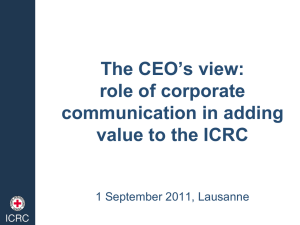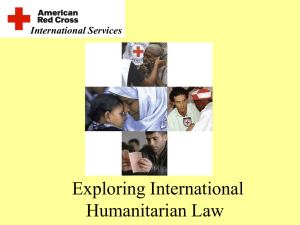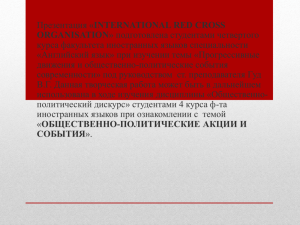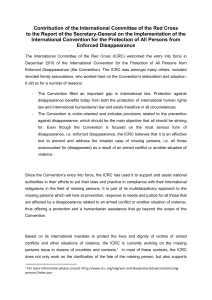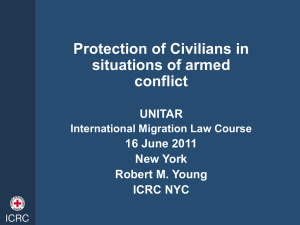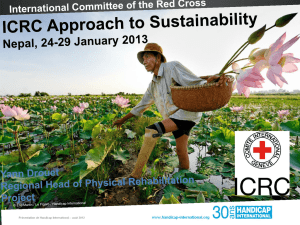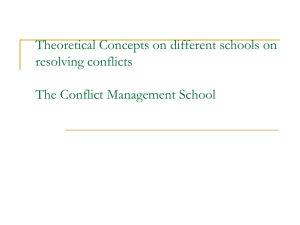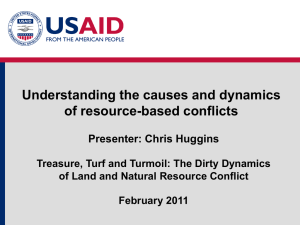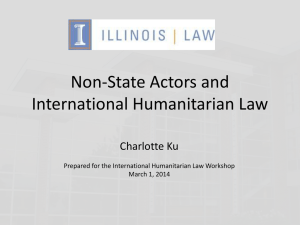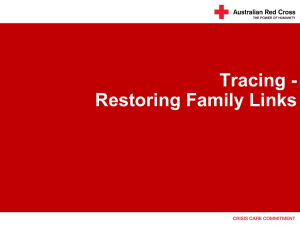ICRC - Punainen Risti
advertisement
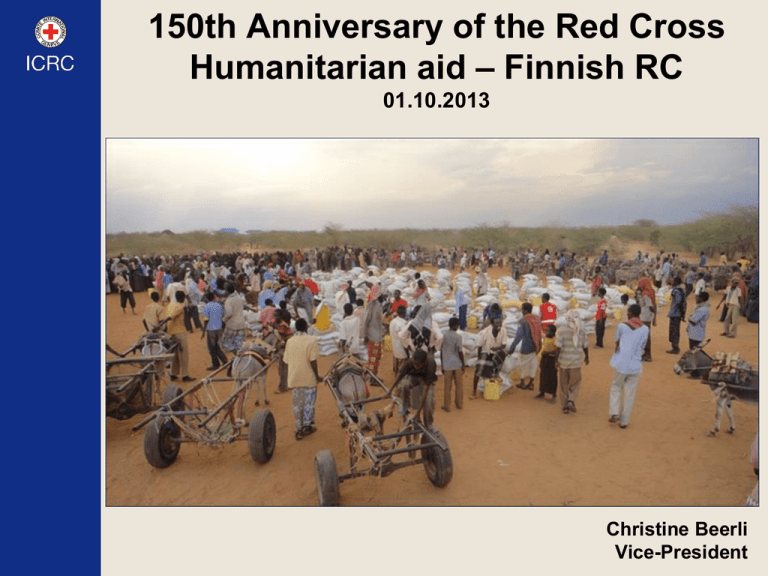
150th Anniversary of the Red Cross Humanitarian aid – Finnish RC 01.10.2013 Christine Beerli Vice-President Presentation outline ICRC‘s role and identity The evolving nature of armed conflict Key operational challenges for the ICRC ICRC role and identity Dual ambition : - assist victims - limit effects of armed conflict Active dialog and engagement with armed forces Special status under international law The ICRC: Mission The International Committee of the Red Cross (ICRC) is an impartial, neutral and independent organization whose exclusively humanitarian mission is to protect the lives and dignity of victims of armed conflict and other situations of violence and to provide them with assistance. The ICRC also endeavors to prevent suffering by promoting and strengthening humanitarian law and universal humanitarian principles. Established in 1863, the ICRC is at the origin of the Geneva Conventions and the International Red Cross and Red Crescent Movement. It directs and coordinates the international activities conducted by the Movement in armed conflicts and other situations of violence. International Red Cross / Red Crescent Movement Victims of armed conflict Promote and develop IHL Health and social work Action in conflict and natural disaster Promote volunteers and youth (Finnish RC established 1877) Coordinating National Societies Natural disasters, health and social crisis International Red Cross / Red Crescent Movement (Coordination of International activities) Seville Agreement Armed conflict (incl. natural disaster in conflict situation) ICRC Lead Agency National Society Primary Partner Natural Disaster, Health outbreaks and social crisis (in peacetime) National Society Lead Agency or Primary Partner of International Federation as Lead Agency Middle East and North Africa - Key trends in armed conflicts and other situations of violence (1) Live and cope with the unforeseeable Leadership changes and elections Political upheavals and armed conflict Complexity and diversity of currents Middle East and North Africa - Key trends in armed conflicts and other situations of violence (1) Live and cope with the unforeseeable Syria - One of the most tragic crisis in modern history 100’000 reported dead, 0.5 mio Wounded, Over 4.3 mio IDPs, 2 mio refugees, thousands of missing… Violations of IHL: widespread and systemic – Protection Crisis Gap widens between needs and response Access, Security, Acceptance Economy severely weakened – local economies Increased spill over incidents & Refugee crisis Exceptional Level of Humanitarian needs Syrian Refugees 1’978’894 Updated 29.08.2013 Middle East and North Africa Key trends in armed conflicts and other situations of violence (1) From SAHEL to SOMALIA: radicalism, fragmentation and regional instability Protracted Conflicts Democratic Republic of Congo Key trends in armed conflicts and other situations of violence (2) Protracted conflicts and connection with resources Afghanistan Key operational challenges for the ICRC(2) Protracted conflicts Key trends in armed conflicts and other situations of violence (3) When elections lead to violence „The fight against Al-Qaeda and its affiliates“ Climate change, displacement, migration and violence Criminality and urban violence Human insecurity and the nature of vulnerability Direct and indirect effects – Acute and chronic needs Physical and mental effects Health Care in Danger (HCiD) The evolving nature of armed conflict(1) Diversity of situations: majority internal conflicts Asymmetry of means and objectives Increase and diversity of non-state armed groups Their tendency of fragment Key operational challenges for the ICRC(1) Scope of action and challenges for access Security and perception Dialogue with all parties to a conflict: „Why and what for“? Demonstrating the addedvalue of neutrality and independence The ICRC and Finland - FinRC ICRC values cooperation with FinRC Long tradition of cooperation in the field of health and surgery (Finnish health staff and equipment): Khao-I-Dang, Pakistan-Afghanistan, South Sudan, Libya, etc. Making the link between ICRC and the Finnish government and general public. Promoting Humanitarian principles and IHL (cf. “MoU Nordic NS on IHL and NIIHA). Rapid Deployment agreement capacity statement Health THANK YOU
